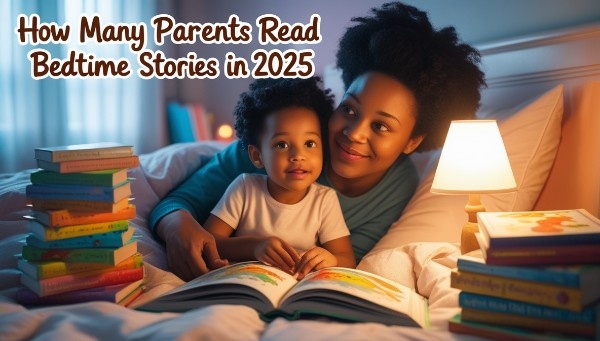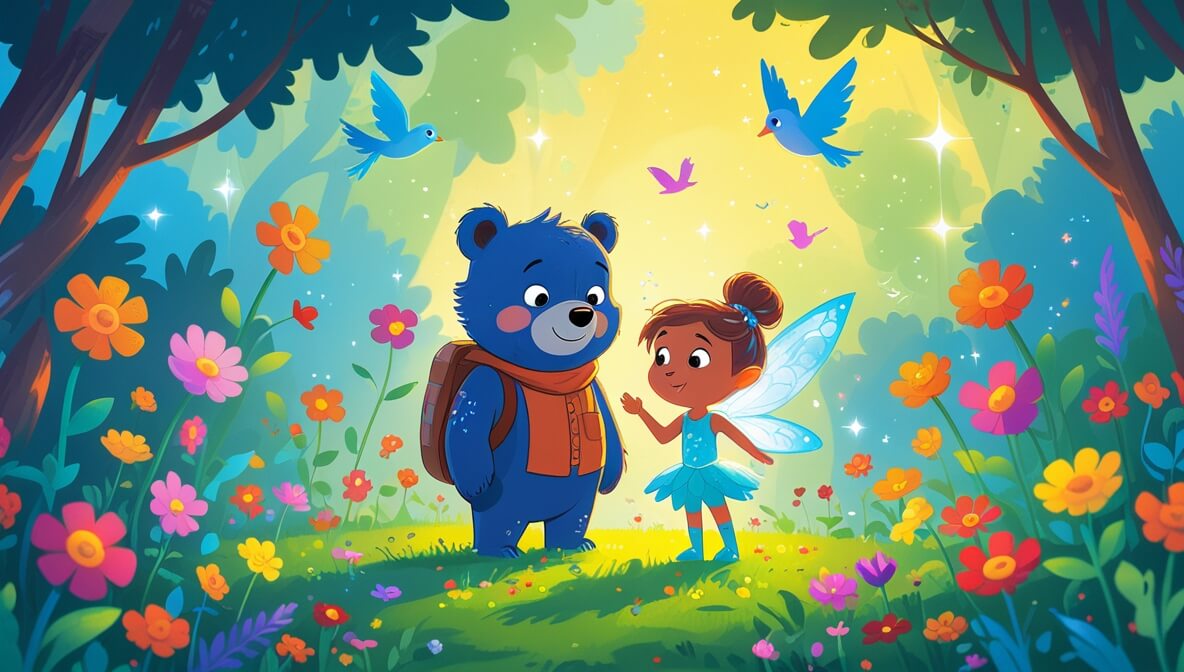Bedtime stories are supposed to be moments of magic, yet new research shows that those moments are becoming rarer.
What Are Latest Statistics About Bedtime Stories?
A December 2024–January 2025 survey by HarperCollins UK and NielsenIQ asked 1,596 parents of children aged 0 – 13 about their reading habits. Just 41 % of parents with children under 5 said they read to their child frequently, down from 64 % in 2012.
Only 36 % of parents with children aged 5–7 said they regularly read together, and fewer than half (40 %) agreed that reading aloud is fun. This lack of enthusiasm has consequences: boys are particularly left out.
In the same study, only 29 % of boys aged 0–2 were read to every day or nearly every day, compared with 44 % of girls, and more than one in five (21 %) boys were rarely or never read to at all. Schools are not filling the gap—daily “story time” in classrooms dropped to 24 % of children aged 5–10 in 2024, compared with 29 % in 2023.
These numbers are striking because the benefits of reading together have been known for decades. Children who are read to daily are almost three times as likely to choose to read independently as those who are read to only weekly.
Yet the HarperCollins survey suggests that many parents now regard reading as merely a skill to be learned rather than a shared pleasure; around a third of 5‑ to 13‑year‑olds said reading is more like a school subject than a fun activity.
Generation Z parents (born between 1997 and 2012) were especially likely to see reading as a subject rather than an enrichment activity.
How Many US and Canadian Parents Read Bedtime Stories
The decline in bedtime stories isn’t limited to the UK.
Scholastic’s Kids & Family Reading Report (8th Edition), a nationally representative US survey of 1,724 parents and children conducted in late 2022, found that while most parents believe reading is important, fewer families are practicing it daily.
According to the report, 51 % of preschoolers (ages 0–5) are read aloud to at home 5–7 days a week, but the proportion drops to 37 % for children aged 6–8 and just 16 % for those aged 9–11.
Despite this, 90 % of parents across all age groups say books create opportunities for conversation and 79 % have used children’s books to support parenting.
This contrast, strong belief but slipping practice, shows how busy schedules and digital distractions can crowd out bedtime reading.
The Canadian edition of the same report paints an even sharper picture. A survey of 1,939 parents and children found that 65 % of parents read aloud to children aged 3–5 at least five days a week, but the frequency drops to 41 % once children reach age 5 and falls again to 16 % after age 8. What’s striking is that 58 % of 6‑ to 8‑year‑olds said they wanted reading aloud to continue, suggesting that many children still crave story time even as adults lose momentum.
Do parents still enjoy reading?
While the HarperCollins survey points to declining enthusiasm, attitudes vary by region. A YouGov poll of 1,034 U.S. adults in July 2025 found that 53 % of Americans love reading to children, and another 25 % say they like it.
Only 14 % were neutral and a mere 3 % disliked it. Among those who have read to kids, 64 % said it’s very important that children’s books are enjoyable to read aloud, 57 % value interesting pictures and 51 % prioritise an educational message.
The poll also revealed that 81 % of Americans have read to children at some point. These numbers suggest that, even as the practice declines in some countries, a majority of American adults still cherish reading aloud.
Another 2025 study looked at reading for pleasure more broadly.
Researchers analysing the American Time Use Survey reported that daily reading for leisure among adults fell from 28 % in 2004 to 16 % in 2023—a 40 % drop.
Notably, however, “the number of those who read with their children hasn’t changed”. This suggests that while adults may be reading less for themselves, many still carve out time to read with kids.
What children think about reading?
The National Literacy Trust’s 2025 Annual Literacy Survey captured the perspective of 114,970 children and young people aged 5–18 in the UK.
It found that only 32.7 % of 8‑ to 18‑year‑olds enjoyed reading—the lowest level in 20 years.
Fewer than one in five (18.7 %) of these children said they read daily for enjoyment.
Even among 5‑ to 8‑year‑olds, daily reading rates dropped to 44.5 %.
Girls read more than boys, and children from higher‑income households read more often than those receiving free school meals.
The Trust notes that motivation drops when books feel disconnected from a child’s interests; two in five children said they would read more if books related to their favourite TV shows or hobbies.
Why Bedtime Stories Matter?
Neuroscientists and educators have long documented the cognitive and emotional benefits of reading aloud.
A Child Mind Institute article explains that hearing stories exposes young brains to varied vocabulary and syntax, helping build neural pathways essential for language and literacy.
Listening to characters’ experiences also nurtures empathy and emotional awareness. Reading together offers a safe way to explore complex feelings and situations while strengthening the parent–child bond.
These benefits go beyond academics: bedtime stories provide comfort, spark imagination and create cherished memories.
What’s driving the decline?
Researchers point to several forces behind the drop in reading aloud.
Screen time is a major competitor; early childhood screen use in the UK jumped from 11 % of zero‑to‑2‑year‑olds spending one to three hours a day on screens in 2014 to 42 % in 2019.
Busy schedules and digital entertainment tempt both children and parents away from books, and Gen Z parents—raised in a world of screens—are more likely to view reading as a subject to learn than a source of joy.
Cultural shifts may also play a role; as one teacher noted, parents who didn’t grow up reading for pleasure may struggle to model that behaviour.
Reimagining bedtime stories in 2025
Despite the discouraging numbers, the research offers clues for reviving bedtime stories:
- Keep it fun. Children are far more motivated when reading feels like play. Choosing books with engaging plots, humour or links to a child’s interests can make reading a treat rather than a chore. Many kids still love being read to—58 % of 6‑ to 8‑year‑olds in Canada want parents to continue reading aloud.
- Be consistent. Frequency matters: children who are read to daily are nearly three times as likely to become independent readers. Even 15 minutes before bed can make a difference.
- Model reading yourself. The Kids & Family Reading Report found that 57 % of frequent readers have parents who read books 5–7 days a week. When children see adults reading for pleasure, they’re more likely to pick up books too.
- Use pictures and voices. YouGov’s poll shows that adults value illustrations and engaging read‑aloud texts. Using different voices or adding simple sound effects can turn a short book into an adventure.
- Meet kids where they are. The National Literacy Trust notes that aligning books with children’s interests—such as tie‑ins to favourite films or hobbies—can re‑ignite reading. Allowing kids to pick some of their own books fosters autonomy and motivation.
Conclusion
Surveys from 2024–2025 reveal a worrying decline in bedtime reading: less than half of parents with young children read aloud regularly and gender gaps leave boys particularly underserved. As children get older, the frequency of shared reading plummets, even though many kids wish it would continue.
Yet there is hope: most American adults still enjoy reading to children, and nearly all parents recognise the value of books.
The research underscores that bedtime stories are more than nostalgic rituals; they build language, empathy and bonds that last a lifetime.
By making story time playful and consistent, parents can preserve this simple act of magic and give their children a gift that screens can’t replace
References
Fewer Parents Are Reading Aloud to Their Kids. Why That Matters
Reading aloud is losing its magic—but we can bring it back
https://www.mother.ly/parenting/why-reading-aloud-is-declining/
Over half of parents don’t like reading to their kids, says survey | Fortune
https://fortune.com/article/half-of-parents-dont-like-reading-to-kids-survey/
Scholastic Kids & Family Reading Report™ Releases New Data to Support Making Books Part of Growing Up for Every Child
Kids and Family Reading Report – Hill Strategies Research Inc
https://hillstrategies.com/2020/02/26/kids-and-family-reading-report/
Most Americans say they love reading to children | YouGov
https://today.yougov.com/society/articles/52531-most-americans-say-they-love-reading-to-children
‘Deeply concerning’: reading for fun in the US has fallen by 40%, new study says | Books | The Guardian
https://www.theguardian.com/us-news/2025/aug/20/reading-for-pleasure-study
Children and young people’s reading in 2025 | National Literacy Trust
Why Is It Important to Read to Your Child? – Child Mind Institute
https://childmind.org/article/why-is-it-important-to-read-to-your-child/









